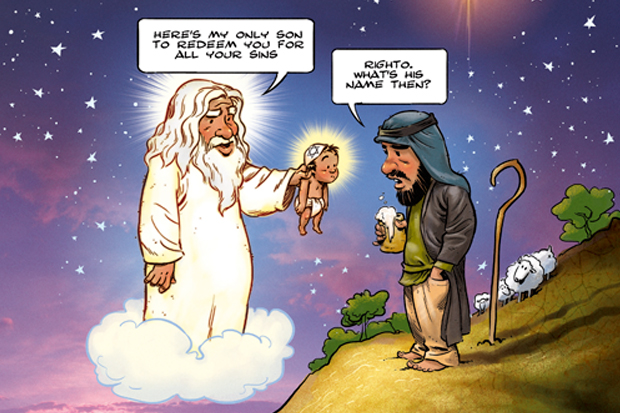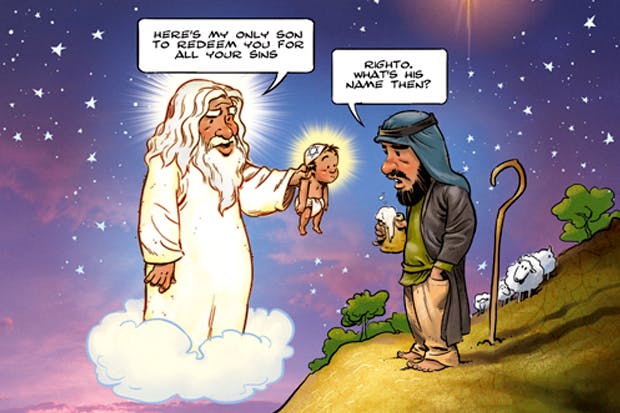Humour is not a feature one normally associates with a National Press Club address. I was surprised and somewhat humbled therefore when Professor Marcia Langton chose to mention one of my cartoons last month, albeit in a not entirely complimentary fashion.
In a brief but scathing critique she dismissed it on the grounds that it was ‘not satire’, was ‘quite ugly’ and ‘not helpful’. She then rattled off a long list of statistics detailing the shocking levels of domestic violence towards aboriginal women and children, proving that while my cartoon may not have met her Eminence’s high standards for satire, it did at least tell the truth.
I drew a dissolute aboriginal father whose level of concern for his own son’s wellbeing was revealed by his inability to remember the boy’s name. I was immediately condemned as a racist by the usual crowd of silly buggers and accused of fabricating a negative stereotype of aboriginal manhood. Indignant male indigenes and their families started furiously sharing their experiences of fatherhood and their family happy snaps under the #IndigenousDads hashtag in a Twitter campaign intended to show me what happy, healthy aboriginal families look like.
Based as it was on the misplaced assumption I’d be a Twitter man, the whole thing was a bit of a fizzer. Besides, among the photos on the wall here in my workroom, there are quite a few of my aboriginal friends, smiling for the camera with their parents and kids. For goodness’ sake, I know what happy, healthy aboriginal families look like.
And I’m sure Professor Langton does too, but the picture she painted of the dysfunctional ones, backed up with facts and figures, made the negligent father in my cartoon look like Father Christmas.
Jacinta Price and Josephine Cashman addressed the National Press Club that day, too. I suspect Race Discrimination Commissioner Tim Soutphommasane wasn’t paying attention. Otherwise they’d surely be facing a complaint by now.
Speaking from direct personal experience, Ms Price revealed that ‘the number of deaths due to homicide that have impacted [her] family are in the hundreds’ and that ‘in the Northern territory alone, for many aboriginal families, this number is in the thousands’.
My cartoon only hinted at the truth about the appalling levels of violence endured by aboriginal women and children, but within minutes of clapping eyes on it, Commissioner Soutphommasane was all over social media urging people to lodge complaints against me with the Australian Human Rights Commission. Yet, although Professor Langton, Ms Price and Ms Cashman didn’t just hint at the same uncomfortable truths, but spoke about them in graphic, excruciating detail, we haven’t heard a peep out of him.
And thank God for that.
And thank God there are indigenous women brave enough to tell the truth because there’s no point in whitefellas like me even trying to.
My cartoon triggered not one, but two debates: one on aboriginal policy and another on freedom of speech and the way section 18C of the Racial Discrimination Act is being used as a weapon to suppress it. The disastrous outcomes in the area of aboriginal policy provide a tragic example of how badly things can go wrong when the views of an elite group claiming the moral high ground hold sway and the alternative ideas of lesser mortals are ignored.
Professor Langton said the strident reaction to my now infamous cartoon exposed the ‘fault lines’ in the response of indigenous people to the violence of their men. But they weren’t the only fault lines it exposed. How about the fault lines between the good intentions of successive generations of policy makers and the diabolical consequences for the people affected by their decisions?
And how about the gaping chasm between the passionate advocacy by the moral narcissists at the AHRC of the imaginary human right to never be offended and their callous indifference to the real human rights of indigenous women and children?
The threat of Islamist terrorism went from being an abstract notion to a brutal reality for me when a cartoon I drew featuring Mohammed so offended the delicate sensibilities of knuckle-dragging barbarians that I was forced to move house in January last year. Now, nearly two years later, the regressive Left are still howling down anyone who speaks openly about the root causes of Islamist terrorism and accusing them of ‘Islamophobia’.
The threat posed to our free society by the sinister forces of PC authoritarianism also made the leap from theory to reality for me in October this year, when I drew a cartoon that told the truth and found myself being persecuted by the Thought Police operating out of the Ministry of Truth. The sudden appearance of this goon squad on the scene was greeted with rapturous applause from the regressive leftists who saw it as an encouragement to heap abuse on and vilify as racists anyone who speaks openly about the suffering of aboriginal Australians.
This is what happens when you try to limit free speech. It’s what happens when the very concept is so misunderstood by so many that Bill Shorten and Mark Dreyfus can score political points by sneeringly referring to freedom of speech as though it meant nothing more than the legal right to hurl abuse at strangers on the bus.
You don’t fix a problem by closing your eyes and imagining it has gone away. We’ll never make progress unless we’re able to talk openly about the scourge before us.
But since when have the purse-lipped misery mongers ever been interested in fixing problems? Heaven forbid – they might run out of things to wring their hands over.
The post A thousand words appeared first on The Spectator.
Got something to add? Join the discussion and comment below.
Get 10 issues for just $10
Subscribe to The Spectator Australia today for the next 10 magazine issues, plus full online access, for just $10.
You might disagree with half of it, but you’ll enjoy reading all of it. Try your first month for free, then just $2 a week for the remainder of your first year.














Comments
Don't miss out
Join the conversation with other Spectator Australia readers. Subscribe to leave a comment.
SUBSCRIBEAlready a subscriber? Log in